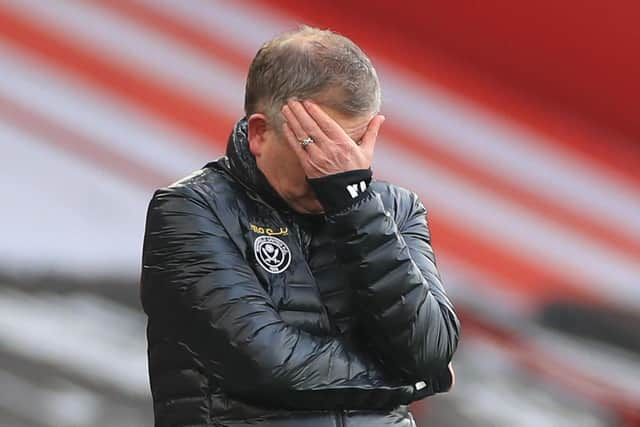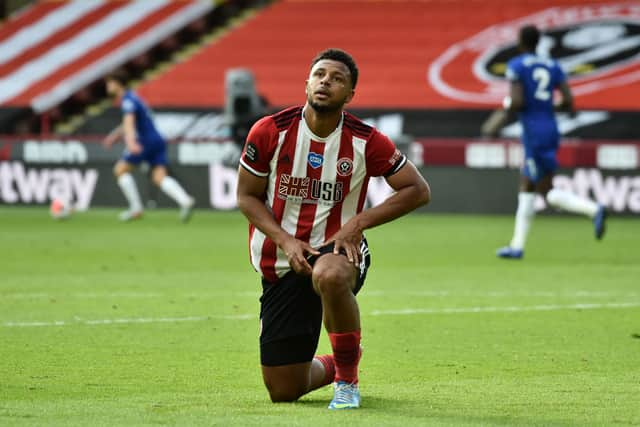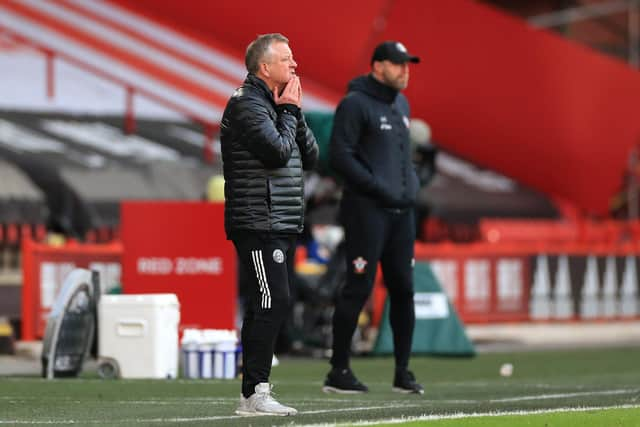Revealed: How - and why - things eventually went wrong for Chris Wilder and Sheffield United
and live on Freeview channel 276
Twelve months on, they find themselves at the bottom of the table, destined for relegation and searching for a new manager following Chris Wilder’s departure ahead of Sunday’s visit to Leicester City.
So where did it all go wrong for a squad of players who entered the new campaign as one of the most talked about in English football and the person responsible for masterminding their fairytale rise through the divisions.
Advertisement
Hide AdAdvertisement
Hide AdThe blame for United’s demise can be attributed to a number of issues and events, some within their control and others not, such as the Covid-19 pandemic.


Injuries have undoubtedly been a factor, something Wilder mentioned countless times himself as he discussed why his side found itself 12 points adrift of safety with only 10 games left to play.
As they gained promotion from the Championship and then appeared to make an almost seamless transition to life at the highest level, United’s starting eleven effectively picked itself with the fitness and conditioning of those within it seldom causing a problem.
But ever since finishing ninth last term, United have lurched from one disaster to another as the loss of Sander Berge, John Egan and Jack O’Connell exposed the lack of genuine depth within their ranks.
Advertisement
Hide AdAdvertisement
Hide AdBeing forced to stage matches behind closed doors, even when social distancing measures designed to fight the spread of coronavirus have been sporadically eased, stripped United of one of the most potent weapons in their armoury.


Restoring the relationship between the team and a support base which had grown disillusioned by the actions of his immediate predecessor Nigel Adkins was arguably Wilder’s most important achievement during his 227 matches in charge.
A lifelong fan and former United player himself, he understood the culture of both the club and the region it represented; ditching the buzzwords, overly positive thinking and spin which all became hallmarks of Adkins’ reign for a much more down-to-earth and brutally frank approach.
It jarred a little at times, particularly when United struggled following the first national lockdown. But, for the most part, it struck a chord with a following which appreciates genuine talent but demands hard work. Losing backing from the terraces was always going to hit United harder than most.
Advertisement
Hide AdAdvertisement
Hide AdDespite chastising members of his team when he felt they deserved it, Wilder was also fiercely loyal. Maybe, on reflection, as shade too loyal as he kept faith with many of those who helped him guide United out of League One and then the Championship.


Initially it was repaid but, as time has gone on, it is apparent that many of them are not up to the task of taking United “to the next level” as Wilder liked to say.
Some should have been moved on, although matching the wages more established clubs such as Burnley, Aston Villa and Crystal Palace could offer the best talent in the second tier meant sourcing high-calibre replacements was difficult.
In this sense, lacking the patronage of a billionaire owner, the speed of United’s surge up the pyramid has come back to haunt them. United appear well-equipped to make an immediate return should they fail to preserve their top-flight status. But short of the proven ability and experience to make a genuine difference at the highest level.
Advertisement
Hide AdAdvertisement
Hide AdAlthough United’s owners have provided as much financial support as they believe they can reasonably afford, there can be no doubt that the market he was forced to shop in became a bone of contention for Wilder.


Likewise, as the board of directors argued they needed to protect their position in the challenging economic climate, the length of time it took United to broker deals for the transfer targets they successfully captured.
Wilder, aware of the need to make precious few mistakes when it came to recruitment, focused his efforts in this sphere on the domestic leagues; reasoning it reduced the chances of new arrivals failing to settle in South Yorkshire.
Other members of the hierarchy wanted a more global approach, which could also have been a cause of friction as Wilder showed little inclination to embrace the ‘United World’ model devised by some of Prince Abdullah bin Musa’ad bin Abdulaziz Al Saud’s most trusted advisors.
Advertisement
Hide AdAdvertisement
Hide AdExpect its members, including Beerschot and Kerala United, to be mentioned more frequently during conversations about United’s behind the scenes strategy over the coming months.
Given the intense politicking behind the scenes at Bramall Lane, a relic of the battle for control between Prince Abdullah and former owner, co-owner and chairman Kevin McCabe, even seemingly minor differences of opinion have the potential to become major problems as old factions disappear and new alliances emerge.
This has meant the lines of communication between members of the coaching staff and board have often not been as clear as either might like, although Prince Abdullah did attempt to reassure Wilder about his future earlier this season.
There have been times when United have excelled despite, not because of, the relationship between boot room and boardroom - even before the Saudi Arabian and McCabe headed for the High Court.
Advertisement
Hide AdAdvertisement
Hide AdUltimately, however, it is results which have cost United one of the most successful and best-loved managers in their history. Or confidence to be exact. Much of the analysis surrounding United’s fall from grace has focused on formations, selections and strength of their press.
It overlooks the fact that, as United slipped deeper and deeper into trouble, their diminishing reserves of self-belief made achieving any sort of improvement almost impossible.
The type of improvement which would have helped them paper over the political cracks.